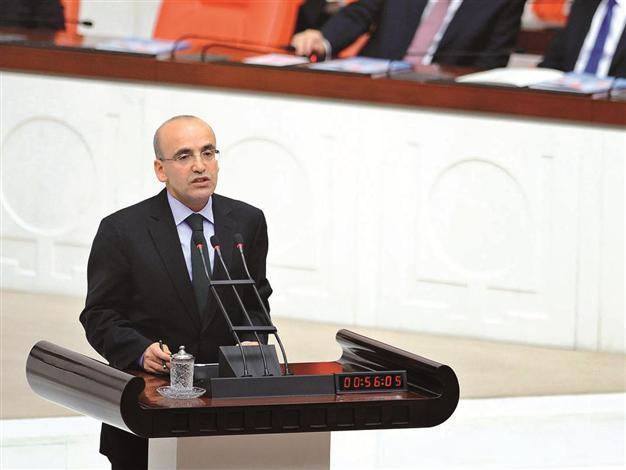Turkey’s economic growth slows down
ANKARA

Finance Minister Mehmet Şimşek introduces the 2013 budget in Parliament yesterday. Opposition leaders slammed the government’s economy policies.
With the Turkish economy growing a mere 1.6 percent in the third quarter, signaling a sharp landing according to several economists, Finance Minister Mehmet Şimşek failed to spread hopes for next year during a parliamentary speech on the 2013 budget yesterday.The Turkish economy, which grew an impressive 8.4 percent in the third quarter of last year, and 8.5 percent in the whole 2011, was mainly hit by low domestic spending and weak investments, according to economists and Cabinet members.
“We aim to reach the potential growth rate in 2014 by accelerating growth in the coming period, despite the global uncertainties,” Şimşek said, admitting that 2012 growth would be under 3 percent.
The governmen’t target at the beginning of the year was 4 percent. The ongoing crisis in Europe, Turkey’s largest trade partner, is also hurting the country’s current account deficit, Şimşek added. Regional political tensions and fiscal problems in the U.S. are other risks, he said, while refraining from citing a concrete growth goal for 2013.
Gold sales play role
Relatively strong exports and a looser monetary policy have not been able to help compensate for the shrinkage. The economy would have shrunk 1.8 percent in the third quarter were it not for exports, according to the data, Reuters calculated.
Gold sales to Iran helped this year’s exports increase. The country’s precious metal exports, which include gold, jumped to $14.3 billion in the first 10 months from $2.7 billion a year ago.
Both domestic demand and net exports must be supported next year to achieve growth targets, said Economy Minister Zafer Çağlayan, while commenting on the latest figures. He once again called on the Central Bank to ease its interest rate policy. The Bank’s Monetary Policy Committee meets on Dec. 18.
“The rally in the lira and local bond markets in recent weeks may provide cover for near-term rate cuts,” said Neil Shearing, chief emerging markets economist at Capital Economics, Reuters reported.
“The key point is that substantial easing would add to pressure on the current account ... The big risk for 2013 is that global sentiment sours, putting the lira under renewed pressure and forcing the Central Bank to tighten policy,” he added.
Development Minister Cevdet Yılmaz said the government was more optimistic about the fourth quarter and expected the economy to grow around 3 percent over the year as a whole, lower than its official 3.2 percent forecast but more in line with economists’ expectations.
Not immune to crisis
“I have been a Turkish growth bull, but this data surprises even me and suggests that even Turkey is not immune to global trends,” said Timothy Ash, head of emerging markets research at Standard Bank.
“A range of factors are coming together to slow the Turkish economy down pretty dramatically, including the global growth slowdown, the eurozone crisis, Turkey’s own balance-of-payments crisis at the turn of the year, which dented confidence domestically, and the aggressive tightening pursued in response by the Central Bank,” Ash said.
OPPOSITION HITS HARD AT GOV’T OVER 2013 BUDGET
Main opposition Republican People’s Party (CHP) leader Kemal Kılıçdaroğlu has said capital owners will benefit from the 2013 budget instead of ordinary people.
“This budget gives nothing to people. This budget transfers the funds obtained from the people to the capital owners via interest yield,” Kılıçdaroğlu said yesterday during a parliamentary debate on the 2013 budget. “The government is not transparent. This government is not giving an account to its people while preparing its budget,” the CHP leader added.
Increasing violence against women is a result of economic difficulties and unemployment, according to the main opposition leader.
“Unemployment is one of the most important economic problems. There is no peace in a family if a family member is unemployed. Did you ever think why violence against women increased 1,400 percent during AKP [ruling Justice and Development Party] rule? Think about a father who is unemployed,” Kılıçdaroğlu said.
The CHP leader also criticized the government over foreign policy during the budget debates. NATO’s radar base stationed in the eastern province of Malatya aims to protect Israel, Kılıçdaroğlu reiterated and claimed that the base did not belong to NATO.
“NATO officials said they have no authority to take over that base until 2014. It’s not a NATO facility,” Kılıçdaroğlu said. He also slammed Prime Minister Recep Tayyip Erdoğan, who said Turkey was a NATO land. “Turkey is not a NATO land, Mr. Prime Minister. You have to apologize due to your remarks,” he said.
















